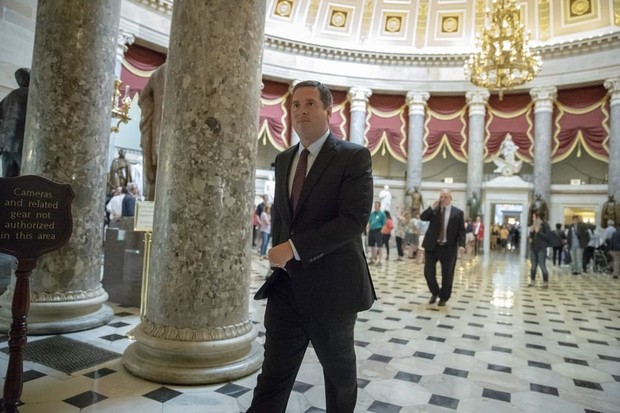
House Intelligence Committee Chairman Devin Nunes (R-Calif.) walks in the Capitol on Thursday. (J. Scott Applewhite/AP)
One of the central features of the ongoing fight between three House committees (Intelligence, Oversight, and Judiciary) and Rod Rosenstein, Christopher Wray, the Department of Justice and the FBI has been the production of documents concerning the genesis of the counterintelligence investigation that has mutated and morphed into Robert Mueller’s indict-o-rama.
Nunes letter to Deputy AG Rosenstein & FBI Director Wray demanding they comply with the committee’s subpoena to review documents pertaining to the bureau’s Russia investigation. In particular, the un-redacted version of the original investigative document. https://t.co/zhp0QxVvV4 pic.twitter.com/NgCC0BNK1s
— Nick Short (@PoliticalShort) April 4, 2018
In particular, Justice has been fighting tooth and nail to keep the identity of one source secret. Justice helpfully leaked this to the Washington Post:
Top White House officials, with the assent of President Trump, agreed to back the decision to withhold the information. They were persuaded that turning over Justice Department documents could risk lives by potentially exposing the source, a U.S. citizen who has provided intelligence to the CIA and FBI, according to multiple people familiar with the discussion and the person’s role.
When you’re dealing with intelligence types, the first clue that they are lying to you is when they rely upon information so secret that you can’t use it. The odds of a source whose life would be endangered by having been involved in kicking off the Trump investigation are so slim as to be non-existent. More importantly, Paul Ryan isn’t buying the nonsense. He’s strongly supporting Nunes and made it clear in his statement yesterday that not only is Nunes’ subpoena reasonable and justified but that Justice had an obligation to provide that information much, much sooner.
Ryan backs Nunes in fight with Justice, saying request is appropriate and that Justice will answer accordingly. He said he spoke to Rosenstein and Nunes/Gowdy about it. He downplayed DOJ concerns when I asked him about Justice warning that disclosure could risk human lives.
— Manu Raju (@mkraju) May 10, 2018
“These guys work for us,” Rep. Stewart says in demanding info from DOJ. McCarthy says there’s no reason for Nunes not to get classified intel. Latest here in GOP falling in line behind Nunes. https://t.co/bF2livT1Kv
— Manu Raju (@mkraju) May 10, 2018
Last night, it seems that Nunes and Gowdy won their battle. After Chief of Staff John Kelly forced Rosenstein to cooperate on another document request on Wednesday, there was a meeting at Justice last night. Afterwards, there were three data points to consider: Adam Schiff is silent, Justice is silent, and Nunes and Gowdy issued a joint statement that was sort of a verbal happy-dance. Take any inference from this that you wish.
Writing in the Wall Street Journal, Kimberley Strassel takes a deep look into why Justice is fighting this. If she’s right, they have a damned good reason.
The bureau already has some explaining to do. Thanks to the Washington Post’s unnamed law-enforcement leakers, we know Mr. Nunes’s request deals with a “top secret intelligence source” of the FBI and CIA, who is a U.S. citizen and who was involved in the Russia collusion probe. When government agencies refer to sources, they mean people who appear to be average citizens but use their profession or contacts to spy for the agency. Ergo, we might take this to mean that the FBI secretly had a person on the payroll who used his or her non-FBI credentials to interact in some capacity with the Trump campaign.
This would amount to spying, and it is hugely disconcerting. It would also be a major escalation from the electronic surveillance we already knew about, which was bad enough. Obama political appointees rampantly “unmasked” Trump campaign officials to monitor their conversations, while the FBI played dirty with its surveillance warrant against Carter Page, failing to tell the Foreign Intelligence Surveillance Court that its supporting information came from the Hillary Clinton campaign. Now we find it may have also been rolling out human intelligence, John Le Carré style, to infiltrate the Trump campaign.
If the FBI did have a paid informant in the Trump campaign then this would be significant.
We also know that among the Justice Department’s stated reasons for not complying with the Nunes subpoena was its worry that to do so might damage international relationships. This suggests the “source” may be overseas, have ties to foreign intelligence, or both. That’s notable, given the highly suspicious role foreigners have played in this escapade. It was an Australian diplomat who reported the Papadopoulos conversation. Dossier author Christopher Steele is British, used to work for MI6, and retains ties to that spy agency as well as to a network of former spooks. It was a former British diplomat who tipped off Sen. John McCain to the dossier. How this “top secret” source fits into this puzzle could matter deeply.
I believe I know the name of the informant, but my intelligence sources did not provide it to me and refuse to confirm it. It would therefore be irresponsible to publish it. But what is clear is that we’ve barely scratched the surface of the FBI’s 2016 behavior, and the country will never get the straight story until President Trump moves to declassify everything possible. It’s time to rip off the Band-Aid.
Indeed. My first guess at this was Carter Page. How has Page managed to give multi-hour, un-lawyered interviews to Mueller’s team and not get indicted for lying to investigators? Despite protestations to the contrary, I remain convinced that Carter Page has been used by the FBI in the past. (Yes, I read the alternative explanation and don’t find it all that plausible.) His sudden romance with Russia..the way he inserted himself into the campaign…his unwise contacts with unsavory Russians have all been suspicious.
But there is a much better choice.
https://twitter.com/seanmdav/status/994047113259515904
https://twitter.com/seanmdav/status/994048254714241030
Via the Daily Caller:
Two months before the 2016 election, George Papadopoulos received a strange request for a meeting in London, one of several the young Trump adviser would be offered — and he would accept — during the presidential campaign.
The meeting request, which has not been reported until now, came from Stefan Halper, a foreign policy expert and Cambridge professor with connections to the CIA and its British counterpart, MI6.
Halper’s September 2016 outreach to Papadopoulos wasn’t his only contact with Trump campaign members. The 73-year-old professor, a veteran of three Republican administrations, met with two other campaign advisers, The Daily Caller News Foundation learned.
Papadopoulos now questions Halper’s motivation for contacting him, according to a source familiar with Papadopoulos’s thinking. That’s not just because of the randomness of the initial inquiry but because of questions Halper is said to have asked during their face-to-face meetings in London.
According to a source with knowledge of the meeting, Halper asked Papadopoulos: “George, you know about hacking the emails from Russia, right?”
The clear implication here is that Halper had talked to either the Australian diplomat with whom Papadopoulos was alleged to have had a conversation about the Clinton email hack in May 2016, or someone close to him. Because the FBI alleges, without proof, that they received that allegation towards the end of July.
Halper met campaign foreign policy adviser Carter Page at a July 2016 symposium held at Cambridge regarding the upcoming election, Page told TheDCNF. The pair remained in contact for several months.
Halper also requested and attended a one-on-one meeting with another senior campaign official, TheDCNF learned. That meeting was held a day or two before Halper reached out to Papadopoulos. Halper offered to help the campaign but did not bring up Papadopoulos, even though he would reach out to the campaign aide a day or two later.
It is thought that the “senior campaign official” is Michael Cohen.
We also know that Halper is a close associate of a retired director of MI-6 and that Christopher Steele shared his Trump dossier with him. It has been reported that the Trump dossier was given to British intelligence. And from there, to John Brennan.
Then the question becomes why? Obviously, part of the operation, the shopping of the Trump dossier to tame media outlets, was to create negative stories on Trump. But the intelligence operation run to give the impression of Russian collusion and the subsequent counterintelligence operation was of no immediate use. It was of use, though, if someone was hedging their bets against the outside chance that Trump might be elected. In fact, one might even call it an insurance policy.
=========
Like what you see? Then visit my story archive.
Follow @streiffredstate
I’ve on Facebook. Drop by and join the fun there.
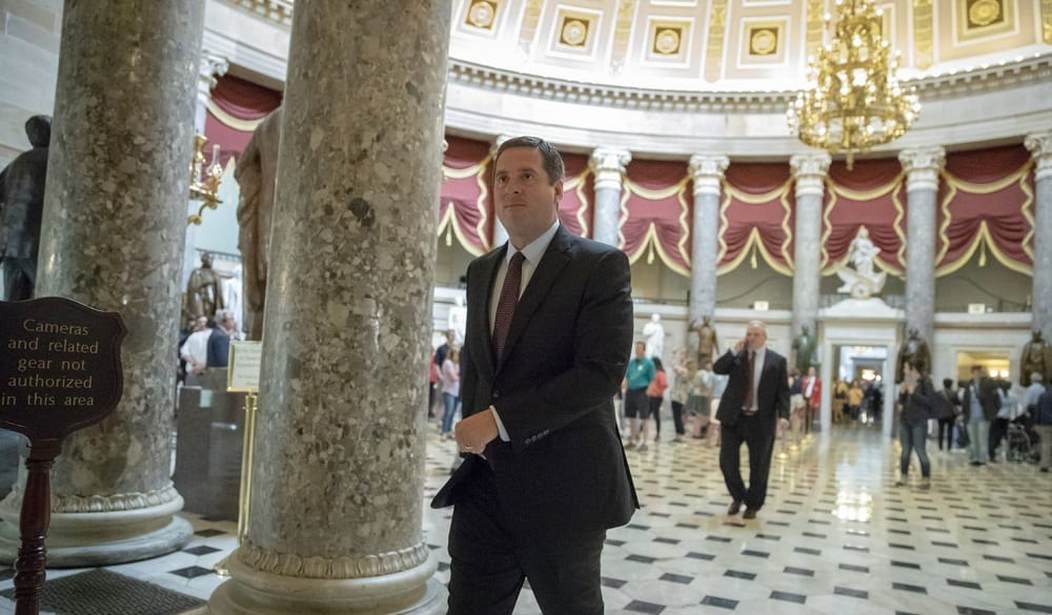



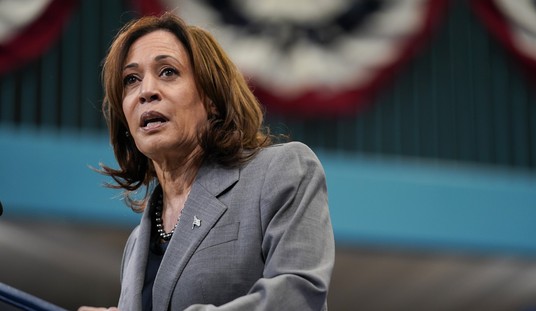
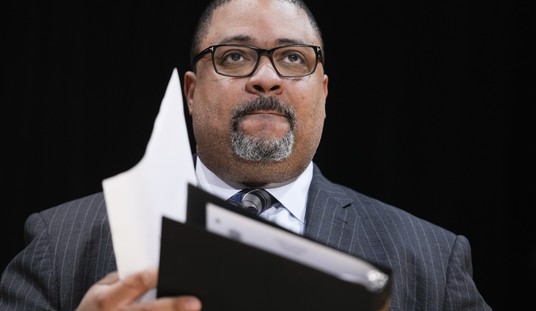
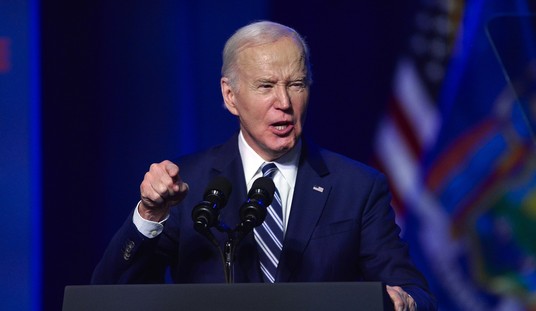


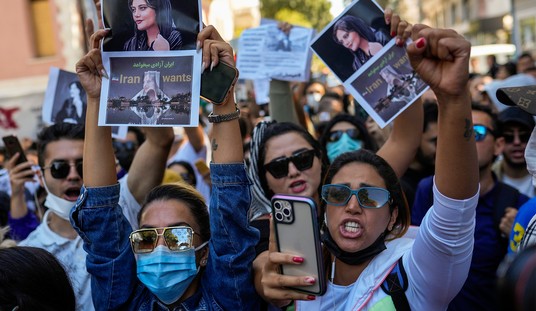




Join the conversation as a VIP Member